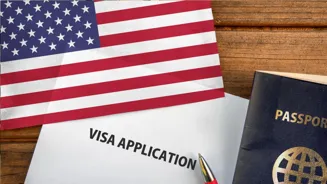The US State Department is proposing a new visa requirement that could significantly alter how some foreign nationals travel to the United States. The move
aims to reduce visa overstays and tighten security by targeting countries deemed high-risk due to high overstay rates or weak internal document controls.
What Are Terms?
- Under a 12-month pilot program, certain applicants for business (B-1) and tourist (B-2) visas may be required to pay a refundable bond of $5,000, $10,000, or $15,000.
- The proposed bond requirement would apply only to nationals from countries identified by the US government as having high visa overstay rates or offering citizenship-by-investment programs that lack residency requirements.
- These countries will be officially named once the rule is implemented, but applicants from nations in the Visa Waiver Program, which includes most European countries, as well as select nations in Asia and the Middle East, will be exempt.
- According to a notice previewed on the Federal Register website, the bond program will take effect 15 days after its official publication and will remain in effect for one year.
- The State Department says the bond is intended to serve as a financial safeguard, ensuring that visitors comply with the terms of their visas.
- If a visitor adheres to the rules and departs the country on time, the bond will be refunded.
- The bond requirement may be waived in individual cases, based on factors such as the applicant's travel history or ties to their home country.
While similar ideas have been floated in the past, visa bonds have never been widely implemented. Previous objections cited the administrative burden and potential for public backlash, but the State Department now argues that there’s no recent evidence to support those concerns.












